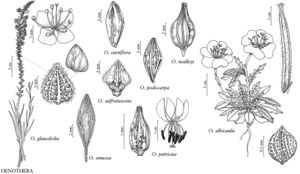Difference between revisions of "Oenothera nealleyi"
PhytoKeys 28: 64. 2013.
imported>Volume Importer |
imported>Volume Importer |
||
| Line 64: | Line 64: | ||
|publication year=2013 | |publication year=2013 | ||
|special status= | |special status= | ||
| − | |source xml=https://xjsachs2@bitbucket.org/aafc-mbb/fna-data-curation.git/src/ | + | |source xml=https://xjsachs2@bitbucket.org/aafc-mbb/fna-data-curation.git/src/e39f0e846f172941159b2045254d62d10d9823f6/coarse_grained_fna_xml/V10/V10_101.xml |
|subfamily=Onagraceae subfam. Onagroideae | |subfamily=Onagraceae subfam. Onagroideae | ||
|tribe=Onagraceae tribe Onagreae | |tribe=Onagraceae tribe Onagreae | ||
Revision as of 10:28, 9 May 2022
Herbs annual, sparsely villous proximally, leaves glabrate to sparsely villous along veins and on margins, usually glandular puberulent in distal parts; from stout taproot. Stems usually well-branched, 20–70(–100) cm. Leaves in a basal rosette and cauline, basal 3.5–9 × 0.5–1.5 cm, blade lyrate; cauline 1.5–7 × 0.1–0.6 cm, blade narrowly lanceolate to linear, margins sinuate-dentate, undulate. Flowers 4-merous, zygomorphic, opening at sunset; floral tube 10–20 mm; sepals 11–21 mm; petals white, fading pink to red, elliptic to elliptic-obovate, 10–15 mm; filaments 8–13 mm, anthers 2–6 mm, pollen 90–100% fertile; style 22–36 mm, stigma exserted beyond anthers at anthesis. Capsules ellipsoid or ovoid, narrowly 4-winged, furrowed between angles, 4.5–8 × 2–5 mm, stipe 0.2–2.2 mm; sessile. Seeds 3 or 4 (or 5), yellowish to light brown, 2–3(–4) × 1 mm. 2n = 14.
Phenology: Flowering Apr–Oct.
Habitat: Washes, sandy places, grasslands, extending to pinyon-juniper woodlands.
Elevation: 1200–2200 m.
Distribution
N.Mex., Tex., Mexico (Coahuila).
Discussion
Oenothera nealleyi is restricted to an area from trans-Pecos Texas and northern Coahuila, Mexico, north to Bernalillo and Torrance counties, New Mexico. P. H. Raven and D. P. Gregory (1972[1973]) considered O. nealleyi to represent an unevenly intergrading entity with O. suffulta based on merging of distinguishing characteristics. The known intermediates occur in Terrell County, Texas, and were previously described as Gaura suffulta var. terrellensis Munz, but until new data on its status are available, we include this name with O. nealleyi. The molecular data (K. N. Krakos, unpubl.) suggest that O. nealleyi is not as closely related to O. suffulta as suggested by Raven and Gregory, given the placement in the phylogeny and the difference in scent profiles for these two taxa. Oenothera suffulta is a member of a strongly supported clade that also includes O. patriciae and O. triangulata, while O. nealleyi is a member of a polytomy that consists of other species of subsect. Gaura, with the O. suffulta—O. triangulata—O. patriciae clade sister to it (W. L. Wagner et al. 2013). Oenothera nealleyi has a strong sweet scent, whereas O. suffulta does not have a discernible scent (Wagner et al.). Raven and Gregory determined O. nealleyi to be self-incompatible.
Selected References
None.
